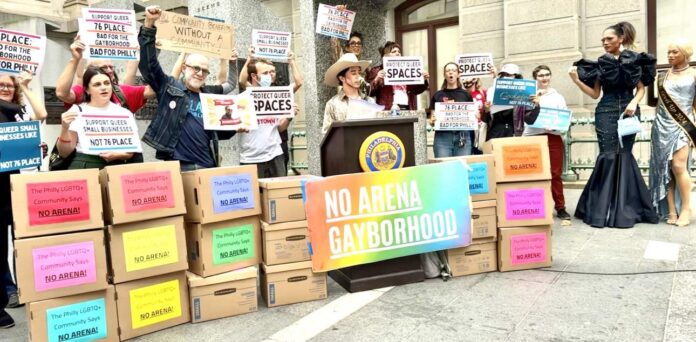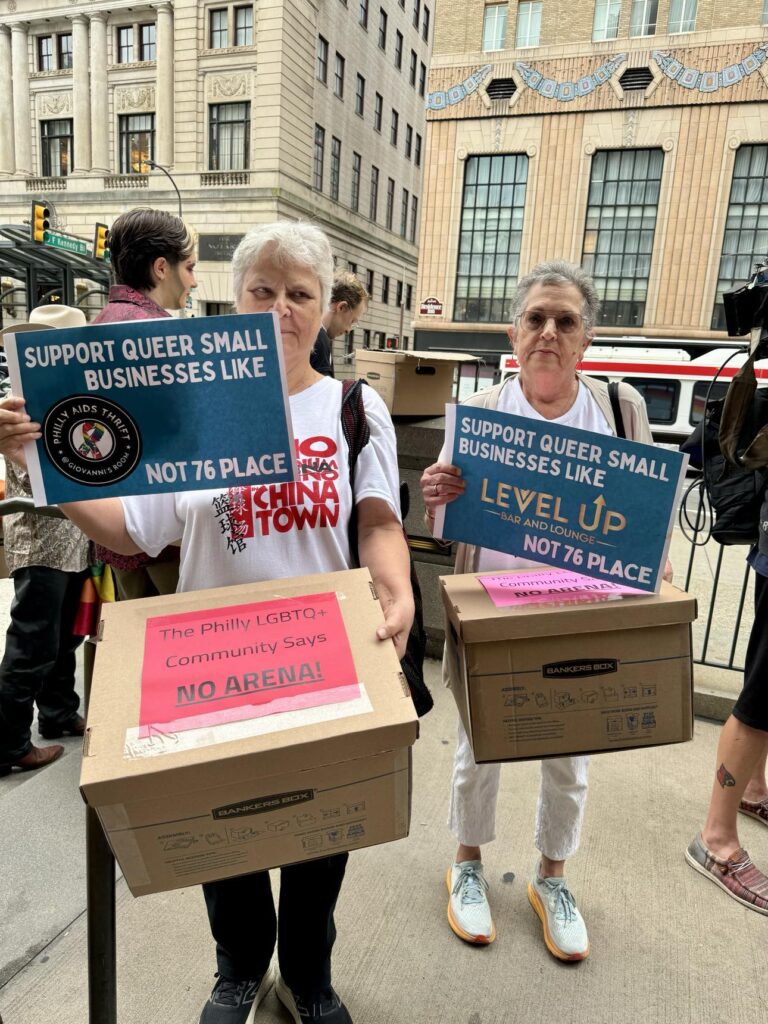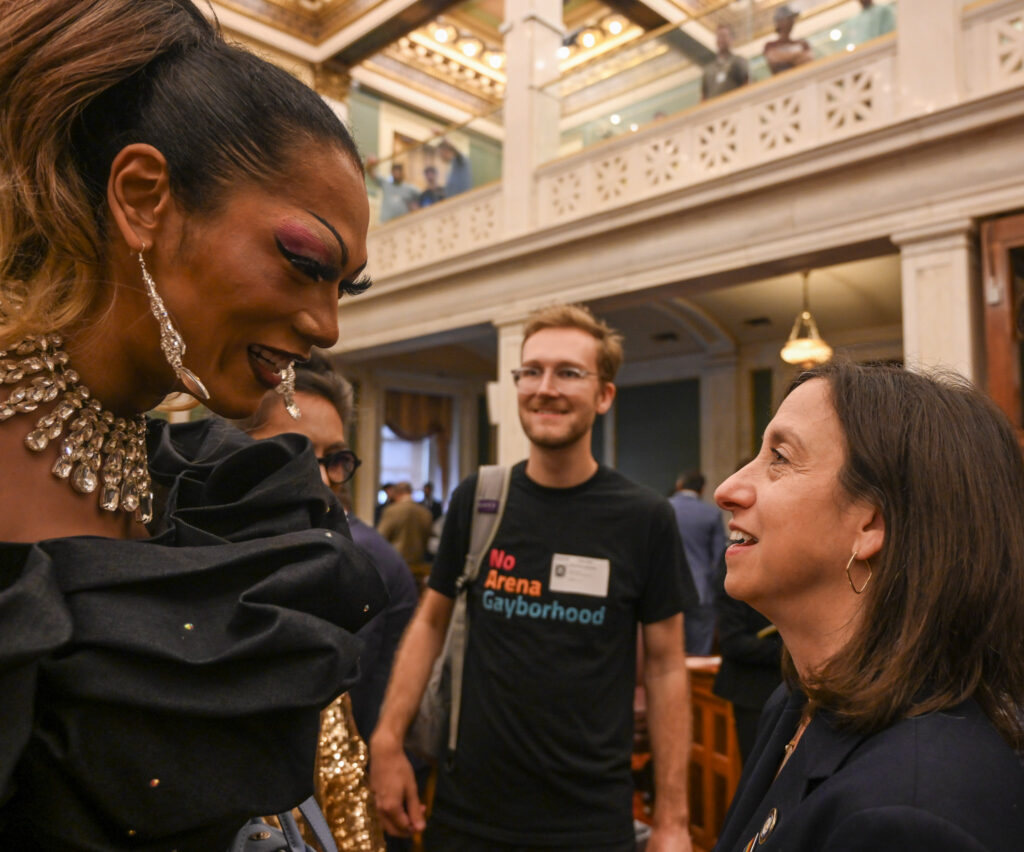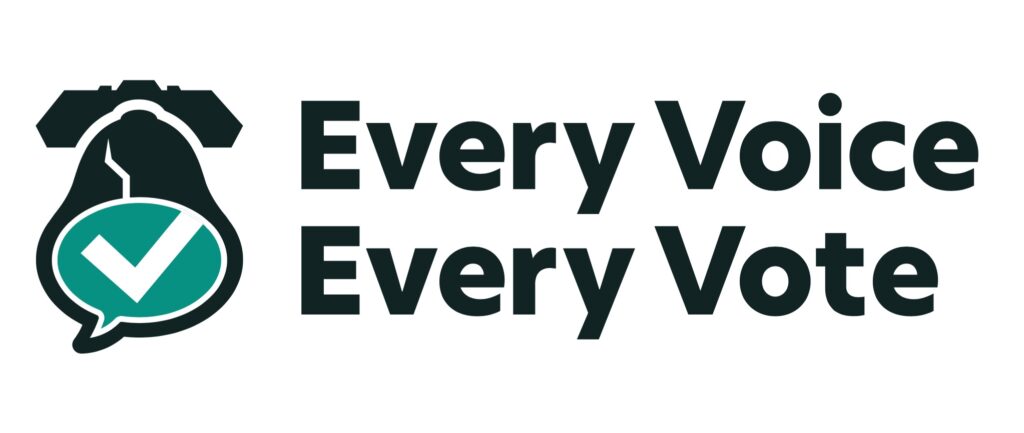
“We are here to say that we know that building an arena in Center City will hurt the Greater Philadelphia queer community,” said Yoojin Park, a social worker who is also known as his drag persona Eugene Rideher Betta, at a press conference organized by No Arena Gayborhood on Thursday, Sept. 26.
“Today, we are petitioning city council to oppose 76 Place,” he added before pointing out a street just a block from City Hall that was recently renamed to honor the life and legacy of Michael Hinson Jr., a Black LGBTQ+ activist. “That’s where the Gayborhood is supposed to start.”
If approved, 76 Place — an arena proposed by the Philadelphia 76ers — would sit at the border of the Gayborhood and Chinatown, disconnecting the neighborhoods from each other. Activists have opposed the proposal for months — citing a variety of concerns, including cultural erasure and numerous hardships that will burden both Chinatown and LGBTQ+ communities.
“Thanks to the hard work of our city council, there are a lot of neighborhood streets named after a queer activists and icons,” Park added. “But queer and trans people don’t get to take up public space in the same way that their cis, straight counterparts can.”
He underlined that LGBTQ+ people are not often welcome to find work, seek resources or build community in places that aren’t specifically designed for them. After continued gentrification, Park noted that what’s left of the Gayborhood should be preserved for LGBTQ+ people without the threat of encroachment.
“Who is Center City for?” asked Lasha Cristál, who is a part owner of the Gayborhood bar Level Up.
“Predatory developers have created a history of pushing queer people of color out of Center City. It happened with the convention center pushing out multiple Black gay bars,” she said. “Despite that though — we are claiming space in the neighborhood. We do not want to be pushed out again.”
She explained that the arena would be built just six blocks from her bar — and she’s worried about the impact on her business and her patrons. Developers believe more people will opt to use public transportation to travel into that area, but she emphasized that some LGBTQ+ people will not feel safe enough to do so.
Lasha Cristál said some Level Up regulars drive over an hour from Atlantic City because there are few nightlife options there that feel safe for LGBTQ+ people of color.
Shometha Monét, a local drag queen and financial planner, said Philadelphians will be forced to go to New York should the Gayborhood continue to shrink — underlining that patrons, performers and business owners must seek opportunities in other cities rather than invest in the local queer community when gentrification pushes them out.
“The queer community is truly the most diverse across the board. Within this community, we cross race. We cross class. We cross ability. We span gender and levels of access in society. Our inherent diversity is where our mindset of inclusivity comes from,” they added. “So we can see right through the marketing. We can tell that an arena made by and for billionaires won’t be an economic catalyst for the community and people that live here.”
Drag queen Deja Vu emphasized that it’s not just Gayborhood businesses that will suffer. She noted that housing displacement and job losses will occur for those who live and work near the proposed arena. She also highlighted ongoing infrastructural issues that remain unaddressed — including safety concerns for cyclists and insufficient access to public transportation, which she believes will get worse if the arena opens.
“We are multifaceted,” she said about LGBTQ+ people of color — underlining that the mayor’s endorsement of the arena shows a disregard for the city’s history, culture and people. “And we deserve a better Philadelphia.”

Over 30 activists joined the demonstration, which started outside of City Hall with a press conference. The group — which has been collaborating with Chinatown activists and other anti-arena efforts — then delivered over 1200 signed petitions to each of Philadelphia’s city council members and Mayor Cherelle Parker. The petitions represent just a small fraction of LGBTQ+ people who oppose the arena.
“It’s a lot of paper, but it’s to show that impact,” Park said. “This can’t be ignored.”
Councilmember Mark Squilla represents the Gayborhood and Chinatown. Under an unwritten agreement known as councilmanic prerogative, he has final say over whether or not the arena is approved.
“We have not seen the legislation yet therefore CM Squilla has not yet taken a position,” a spokesperson for the councilmember recently told Philly Voice.
Three council members —- Kendra Brooks, Nicolas O’Rourke, and Jeffery Young Jr. — outwardly oppose the current arena plan. Just one is fully supportive, and thirteen remain uncommitted or offered no response when questioned by Philly Voice.
Rue Landau, the only openly LGBTQ+ council member, declined to comment on the protest and the arena when contacted by PGN. However, she and some other council members did speak with protesters as they delivered the petitions.

On Wednesday, Sept. 25 — the evening before the protest, Mayor Parker shared new details outlining aspects of the agreement she reached with the 76ers. She claims that no city funding will be used to complete the build — underlining that the cost of the arena will not be burdened by taxpayers.
“I think Cherelle Parker thinks that because she is in the executive position that she’s the one — that it’s her opinion that matters most,” Park said.
Last month, the city released reports that outline findings from studies that address concerns about economic impact, traffic and transportation, and broader community impacts. But the Gayborhood was not included in those studies — so it’s unclear how exactly the area will be affected.
Parker claimed that the arena will bring in $700 million in new tax revenues and that the Chinatown community will benefit from a $50 million Community Benefits Agreement.
A variety of ordinances and resolutions related to the arena were posted to the city’s website. This legislation package will be available for 30 days before it’s formally introduced in a city council meeting.
“So what that means is we only have 30 days left to organize,” Park said.

